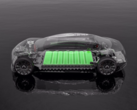Apple had a part in developing the vaunted BYD Blade battery technology that it wanted to use in its electric car.
The team from Cupertino saw the potential in iron phosphate (LFP) batteries in terms of safety and cost early, but wanted a custom-built pack that will also provide longer range on a charge.
BYD is the world's second-largest EV and battery maker, and Apple started the partnership with its R&D team as far back as 2017. It spent about $10 billion on the Apple Car project called Titan before ultimately deciding that it will be very hard to maintain decent profit margins in the electric car industry.
Thus, Apple scrapped the venture earlier this year, dispersed the team to other departments, and rescinded its self-driving test permits at the California DMV shortly before Tesla's Robotaxi unveiling.
Apple reportedly came to BYD with its expertise in custom battery packs and thermal management, while BYD contributed with its LFP manufacturing technology. The BYD Blade battery technology is now instrumental in its unrelenting march towards EV market share dominance, as it allows for a structural battery pack that is cheaper, safer, and with higher energy density than previous cell packing technologies.
That is what sparked Apple's interest in the first place, despite that it got shown a rather rudimentary version of the BYD Blade battery. LFP cells rely on abundant iron phosphate, rather than expensive metals like nickel or cobalt that are found in the packs of today's performance electric vehicles.
The LFP batteries have since been adopted by nearly every automaker, including Tesla, despite their slightly lower energy density and inferior charging performance in cold weather. LFP packs, however, can be charged to full without marked increase in battery degradation speed, while CATL and BYD, the largest makers of such cells, have developed new generations with energy density bordering on legacy chemistries, and faster charging in the cold.
LFP cells are also widely used in energy storage systems and portable power stations or power banks that require cheaper cells with a long lifespan.
Besides the iron phosphate chemistry, Apple Car investments included nickel and alkaline cells, while the Project Titan team quickly saw the potential in the so-called structural battery packs that allow more cells to be fitted in the same footprint, or what the BYD Blade technology ultimately brought to market.












